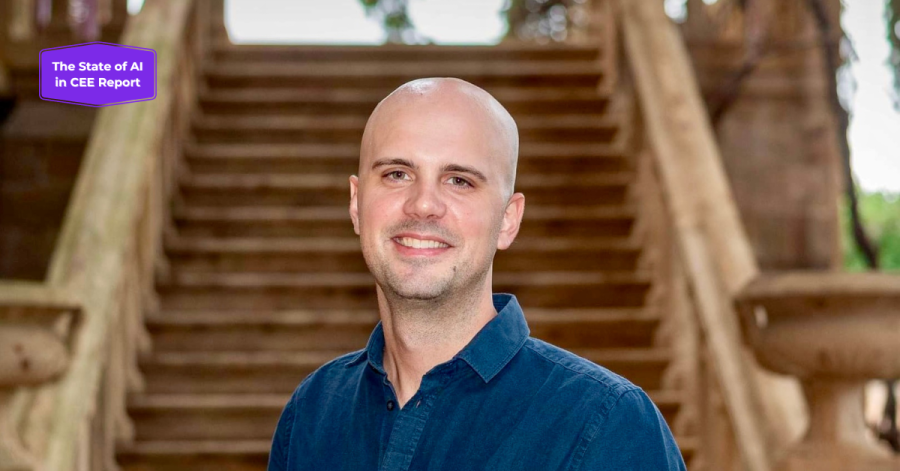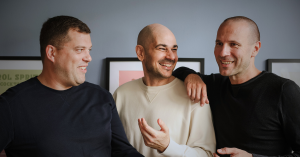Alex Alexakis is an investor at the Greek fund Marathon VC. Before that, he was a product manager at two of the highest-growth startups coming out of Greece – Workable and Blueground.
In 2020, he created a medium covering Greek startups, called Startup Pirate. Over the years, it has become a reference point for the community with news, interviews with founders, analyses, and job opportunities through a newsletter and website.
In this interview, we discuss why Greece has a high density of engineers and scientists, particularly in AI-related fields, Marathon’s investment strategy that seeks startups uniquely positioned to solve problems in significant, fast-growing markets, and the competitive edge of Greece and CEE in AI innovation. According to Alex while the region has strong R&D capabilities, it still lacks a culture of building prosperous businesses. Dig below for more insights.
The following interview was conducted as a part of The Recursive’s “State of AI in CEE” report. Download the full report with insights from 40+ experts and an analysis of 900 AI product companies from CEE.
The Recursive: What key trends are you observing when it comes to AI startups in Greece?
Alex Alexakis: We increasingly see teams using artificial intelligence to solve big problems and address large market opportunities. Many of them even aim to disrupt traditional industries dominated by companies that were either unsuited for world-class software development or weren’t incentivized to pursue creative solutions including energy, construction, healthcare, agriculture, defense, space, etc. As technology breakthroughs happen and the areas of commercial application for AI and its business impact become apparent, more builders and investors are directed toward AI-first solutions. This has been unfolding for the past years, aligning with the broader trend in Europe and globally.
You mentioned energy, defense, agriculture. Why do you think AI solutions for these exact industries emerge in Greece?
There are teams building AI products across a number of different industries, so I wouldn’t say there’s a sort of specialization in a particular field. Perhaps what makes more traditional industries ripe for disruption by startups using AI is that the incumbents have been mostly unaware or unwilling to adopt the latest technologies in the past decade. They are left behind (with a few exceptions) in technological progress, which isn’t necessarily the case for industries that revolve around information technology (office workers).
I think the unique advantage of Greece in the era of technology renaissance led by AI is the highly educated and skilled tech workforce.
Greece and Greek diaspora have a high density of AI scientists and engineers with a presence in the top AI conferences (NeurIPS, ICML, etc) and big tech companies worldwide. Some of them have already returned to the country to build world-class technology products. One of them is Dimitrios Kottas who worked at Apple before returning to Greece to found Lambda Automata, a defense AI startup that Marathon has invested in.
There are examples of successful founders who finished their studies in Greece and went on to address problems they were passionate about such as Dimitris and George, the founders of Augmenta, an agricultural AI startup that was acquired by the second-largest global agtech manufacturer earlier this year. They started the company right after finishing their engineering degrees in Volos, a city in the north of Greece.
We often see exciting new AI products emerge from this highly technical pool of people and get funded either by local or international investors.
What are the challenges that AI startups face in Greece when it comes to funding?
When it comes to fundraising, most of the challenges faced by companies in Greece are similar to those faced across Europe. The field has been leveled to some extent as local and international investors look across the same investment opportunities. This is not AI-specific. It spans most industries and in the past year, valuations plummeted and funding activity went down significantly across the tech market. It became more difficult for founders to persuade investors of the viability and uniqueness of their business model.
However, due to the recent technological breakthroughs in AI and the rise of new commercial applications, AI-first companies received a larger part of the available funding compared to previous years. More founders and investors
became enthusiastic about the opportunities that this technology enabled.
But overall, given there’s less available capital for startup investments, teams need to show more proof points compared to some years ago in order to persuade investors and raise capital.
What are those proof points that are demanded by investors right now?
I believe it’s a combination of being uniquely positioned to solve the problem you are going after and addressing a large enough and fast-growing market opportunity. So, it’s taking into account both the market and team. What are your unique insights? Why this particular team? Using the example of Augmenta again; the founders were farmers and engineers. They knew both the market that they were going after, creating a solution for farmers (a market of hundreds of millions of people whose job is to feed the global population), and at the same time, they were technology experts.
Also, given my background in products, I personally want to see how the product and technology they’re building fits into the picture. Of course, as the company progresses and wants to raise money some years in the company’s journey, then investors pay more attention to things like market traction and revenues.
Do you think there is enough availability of AI talent in Greece that serve the needs of growing AI startups?
As I mentioned before, Greece is a country with a high density of engineers and scientists in several fields including AI, cryptography, front-end development, security, etc There are a number of successful AI startups that have built a tech hub in the country such as Marathon-portfolio company Causaly (which uses AI to help scientists during their drug discovery process and has raised over $90m to date), while other companies decided to tap on the local talent through acquisitions or even though there was no Greek co-founder or affiliation.
Now as more and more AI-first companies are created, growing and reaching global audiences, and achieving exciting milestones, I think we will continue to see not only more AI talent coming straight out of university but also more senior people who can build and lead world-class AI teams.
You have a fund in Greece that invested in university spin-offs and a recent legislative initiative to streamline the process of tech transfer. One can say you have a good tradition there.
Yes, I think more emphasis is put on technology transfer globally.
Greece recently introduced new legislation that tried to streamline the spin-off process and establish a comprehensive regulatory framework. We have invested in a number of spin-offs (Greek and European). An example is CodeBGP, which was recently acquired by Cisco, and that was a spin-off from the Greek Foundation for Research and Technology. There’s a lot of talent in Greek universities and research centres and setting the right foundations during the company’s incorporation is crucial for the future success of the spin-off.
There’s progress over the past years and a good number of teams that spin off from universities or research institutions and build valuable technological assets. However, if we want to build not only technological assets but successful businesses that go the extra mile, there’s still a lot of work to be done in areas such as cultivating entrepreneurial spirit (which is often contradictory with how grants are structured), the percentage of equity stake universities take (which in Europe is often much higher compared to the US), etc.
You have a lot of AI companies in your portfolio. Why did you decide to invest more in such companies even before this became a widespread trend?
At Marathon, our mission is to help ambitious Greek founders build world-class technology companies We don’t specialize in specific industries, and we’ve invested in software and hardware from healthcare to cybersecurity, agriculture, devtools, energy, drones, and more. We like companies that work on hard engineering or science technologies and address big problems. Many of the founders we have backed since 2017, when Marathon started, use AI to address these large market opportunities and we support them not only with capital but also do whatever it takes to help them build an industry-defining company.
Do you offer support to the startups in your portfolio when it comes to developing their AI strategies and developing thе technology if they’re not AI-first startups?
We offer all portfolio companies support in the company-building process throughout their journey and we are here to help from recruiting the right talent to crafting a compelling narrative, acting as a sounding board in strategic decisions, and much more. But founders are the market and technology experts and I don’t think investors are not the ones that should dictate how to develop their technology, product, or their go-to-market strategy.
When you’re evaluating AI startups, do you have criteria for the ethical implications of the technology?
We first look to understand the technology the company develops and how it handles areas like data privacy and security, bias and fairness, regulatory compliance, whether there have been any past incidents or controversies related to the startup’s technology or practices, and conduct thorough due diligence to identify any hidden ethical risks.
What do you think about the EU approach to AI regulation? How would the European AI Act affect startups that are developing AI-first products and services?
As far as I know, the European AI Act has not been finalized yet. I wouldn’t want to comment on something that is still a work in progress. I believe regulators are working side by side with technologists to develop frameworks that address the specifics of the technology they are aiming to regulate.
There’s a lot of work to be done from the regulatory side first to understand how AI models are created, and second – what is the best for both – to foster business innovation and at the same time to protect consumers, etc.
What do you think is the competitive edge of CEE when it comes to AI?
We have a lot of teams that build interesting technology products. But there’s a difference between doing an R&D and building a prosperous business.
We can talk about culture and policy yet nothing beats watching your peers raising the bar repeatedly and building successful companies that go the distance and have significant liquidity events. In Greece and the broader region this is missing. Even though we already have some role models for the next wave of entrepreneurs – founders who are determined to change the world and crash competition – we need more people who go the extra mile and offer 10x solutions instead of 10%.








